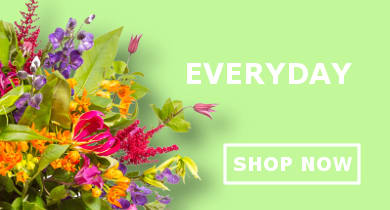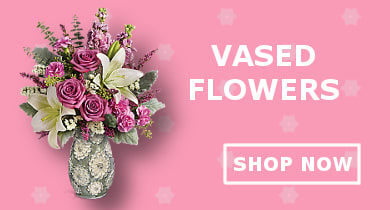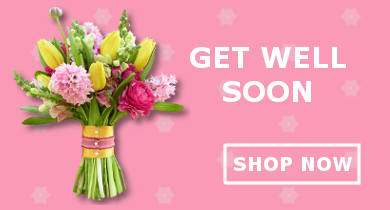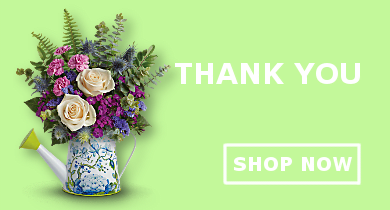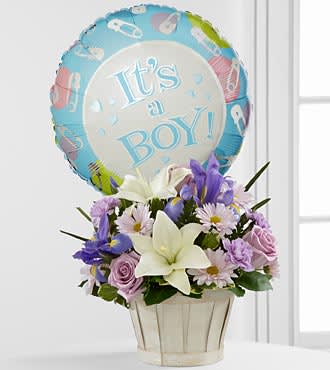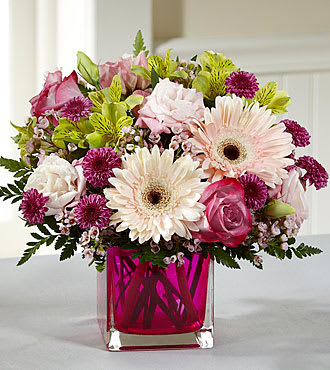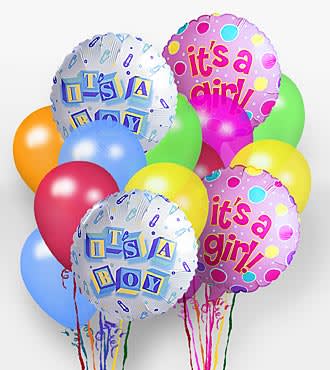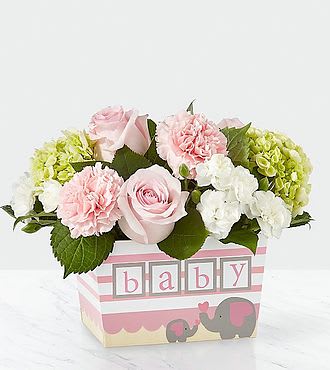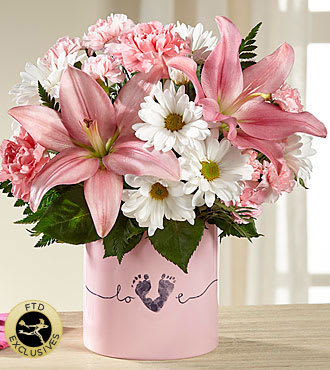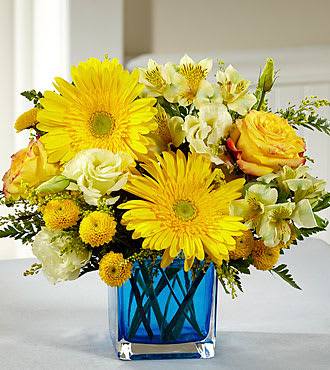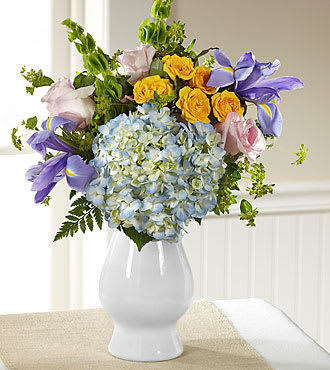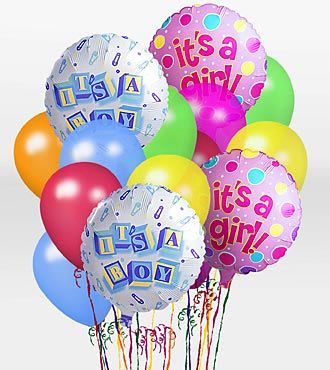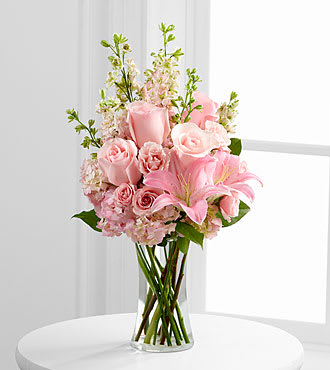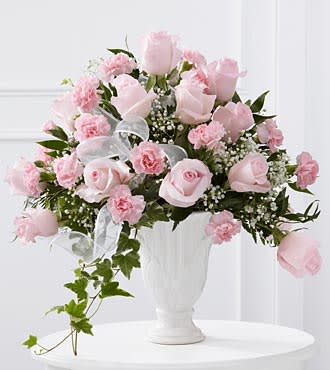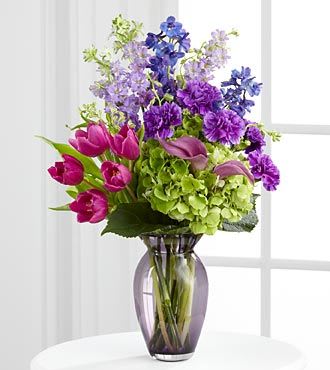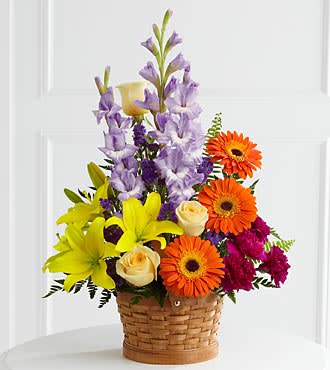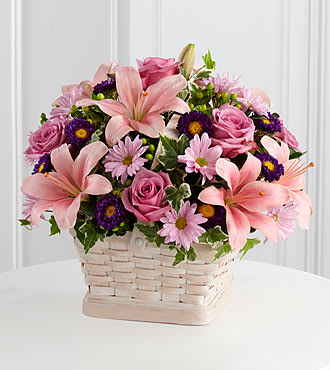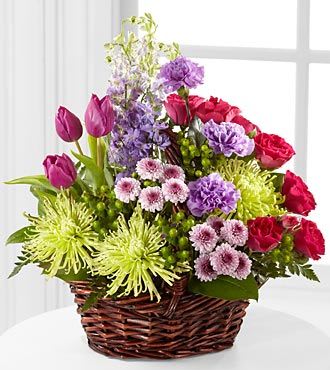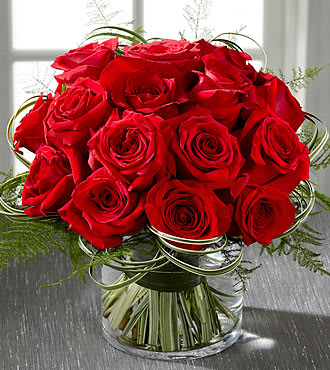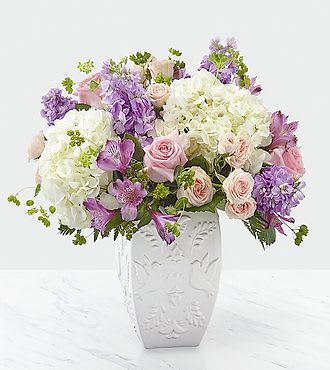- New Baby
- Best Sellers
- Under $100
- $59.90
- $64.90
- $39.90
- $89.90
- $89.90
- $87.90
- $97.90
June 1, 2025
Clark June Floral Selection
The Bloom Central flower delivery of the month for June in Clark is the Intrigue Luxury Lily and Hydrangea Bouquet
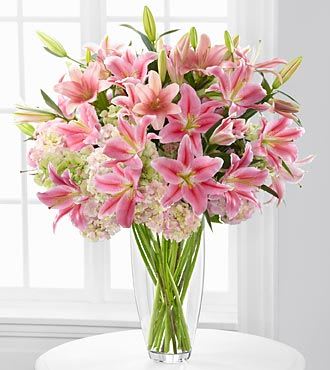
Introducing the beautiful Intrigue Luxury Lily and Hydrangea Bouquet - a floral arrangement that is sure to captivate any onlooker. Bursting with elegance and charm, this bouquet from Bloom Central is like a breath of fresh air for your home.
The first thing that catches your eye about this stunning arrangement are the vibrant colors. The combination of exquisite pink Oriental Lilies and pink Asiatic Lilies stretch their large star-like petals across a bed of blush hydrangea blooms creating an enchanting blend of hues. It is as if Mother Nature herself handpicked these flowers and expertly arranged them in a chic glass vase just for you.
Speaking of the flowers, let's talk about their fragrance. The delicate aroma instantly uplifts your spirits and adds an extra touch of luxury to your space as you are greeted by the delightful scent of lilies wafting through the air.
It is not just the looks and scent that make this bouquet special, but also the longevity. Each stem has been carefully chosen for its durability, ensuring that these blooms will stay fresh and vibrant for days on end. The lily blooms will continue to open, extending arrangement life - and your recipient's enjoyment.
Whether treating yourself or surprising someone dear to you with an unforgettable gift, choosing Intrigue Luxury Lily and Hydrangea Bouquet from Bloom Central ensures pure delight on every level. From its captivating colors to heavenly fragrance, this bouquet is a true showstopper that will make any space feel like a haven of beauty and tranquility.
Clark Michigan Flower Delivery
Looking for flower delivery?
Bloom Central is your ideal choice for Clark flowers, balloons and plants. We carry a wide variety of floral bouquets (nearly 100 in fact) that all radiate with freshness and colorful flair. Or perhaps you are interested in the delivery of a classic ... a dozen roses! Most people know that red roses symbolize love and romance, but are not as aware of what other rose colors mean. Pink roses are a traditional symbol of happiness and admiration while yellow roses covey a feeling of friendship of happiness. Purity and innocence are represented in white roses and the closely colored cream roses show thoughtfulness and charm. Last, but not least, orange roses can express energy, enthusiasm and desire.
Whatever choice you make, rest assured that your flower delivery to Clark Michigan will be handle with utmost care and professionalism.
Clark MI Flower Stores
Would you prefer to place your flower order in person rather than online? Here are a few Clark florists to reach out to:
AR Pontius Flower Shop
592 E Main St
Harbor Springs, MI 49740
Co-Ed Flowers & Gifts
538 Ashmun St
Sault Ste Marie, MI 49783
Flower Station
1262 Mackinaw Ave
Cheboygan, MI 49721
Mann Florist
324 Queen Street East
Sault Ste Marie, ON P6A 1Z1
Port of Call Restaurant
30420 E Johnswood Rd
Drummond Island, MI 49726
St Ignace In Bloom
259 Bertrand St
Saint Ignace, MI 49781
The Coop
216 S. Main
Cheboygan, MI 49721
The Flower Shop
179 Gore St
Sault Ste Marie, ON P6A 1M4
Weber's Floral & Gift
6633 Main St
Mackinac Island, MI 49757
Webers Floral and Gift
110 W Elliott St
Saint Ignace, MI 49781
All About Roses
The rose doesn’t just sit there in a vase. It asserts itself, a quiet riot of pigment and geometry, petals unfurling like whispered secrets. Other flowers might cluster, timid, but the rose ... it demands attention without shouting. Its layers spiral inward, a Fibonacci daydream, pulling the eye deeper, promising something just beyond reach. There’s a reason painters and poets and people who don’t even like flowers still pause when they see one. It’s not just beauty. It’s architecture.
Consider the thorns. Most arrangers treat them as flaws, something to strip away before the stems hit water. But that’s missing the point. The thorns are the rose’s backstory, its edge, the reminder that elegance isn’t passive. Leave them on. Let the arrangement have teeth. Pair roses with something soft, maybe peonies or hydrangeas, and suddenly the whole thing feels alive, like a conversation between silk and steel.
Color does things here that it doesn’t do elsewhere. A red rose isn’t just red. It’s a gradient, deeper at the core, fading at the edges, as if the flower can’t quite contain its own intensity. Yellow roses don’t just sit there being yellow ... they glow, like they’ve trapped sunlight under their petals. And white roses? They’re not blank. They’re layered, shadows pooling between folds, turning what should be simple into something complex. Put them in a monochrome arrangement, and the whole thing hums.
Then there’s the scent. Not all roses have it, but the ones that do change the air around them. It’s not perfume. It’s deeper, earthier, a smell that doesn’t float so much as settle. One stem can colonize a room. Pair roses with herbs—rosemary, thyme—and the scent gets texture, a kind of rhythm. Or go bold: mix them with lilacs, and suddenly the air feels thick, almost liquid.
The real trick is how they play with others. Roses don’t clash. A single rose in a wild tangle of daisies and asters becomes a focal point, the calm in the storm. A dozen roses packed tight in a low vase feel lush, almost decadent. And one rose, alone in a slim cylinder, turns into a statement, a haiku in botanical form. They’re versatile without being generic, adaptable without losing themselves.
And the petals. They’re not just soft. They’re dense, weighty, like they’re made of something more than flower. When they fall—and they will, eventually—they don’t crumple. They land whole, as if even in decay they refuse to disintegrate. Save them. Dry them. Toss them in a bowl or press them in a book. Even dead, they’re still roses.
So yeah, you could make an arrangement without them. But why would you?
More About Clark
Are looking for a Clark florist because you are not local to the area? If so, here is a brief travelogue of what Clark has to offer. Who knows, perhaps you'll be intrigued enough to come visit soon, partake in some of the fun activities Clark has to offer and deliver flowers to your loved one in person!
Clark, Michigan, sits in the state’s eastern mitten like a button sewn to a coat you forget about until winter, which here arrives early and lingers like a guest who doesn’t grasp hints, though no one in Clark seems to mind. The town’s single traffic light blinks yellow year-round, a metronome for a rhythm so regular it feels less like monotony than a kind of covenant. People here still wave at strangers, not the frantic windshield-smear of vacation spots, but a two-finger lift from the steering wheel, a tiny flare of recognition: I see you, you exist. The air smells of thawing earth in April and woodsmoke by October, and the sky in between is the blue of a Schwinn forgotten in a yard and faded by the sun.
The heart of Clark is its river, the Maple, which twists through the town’s center with the quiet persistence of a librarian reshelving books. Kids skip stones where the water slows near the old train trestle, now a graffiti-free zone where teenagers carve initials into birches instead. The river’s banks host an annual parade each June, a spectacle involving papier-mâché trout, kazoos, and a man dressed as Paul Bunyan who rides a riding mower instead of a blue ox. No one remembers how this tradition started, which is precisely why it persists.

Same day service available. Order your Clark floral delivery and surprise someone today!
Downtown Clark has a diner called The Cozy Cup where the coffee tastes like nostalgia and the waitress, Marge, knows your sandwich order before you slide into the vinyl booth. Regulars come less for the pie, though the raspberry crumb is transcendent, than for the sense that time here moves at the speed of syrup. The hardware store next door still has a hand-cranked cash register, and its owner, Walt, will spend 20 minutes explaining how to fix a leaky faucet even if you’ve already Googled it. There’s a quiet pride in this, a belief that expertise should be communal, that the answer to any problem might live not in a algorithm but in the human throat.
The library, a brick cube built in 1938, has a section dedicated to local history: photos of Clark’s first auto shop (1922), a shoebox of letters from soldiers who trained at the long-gone airfield, a quilt stitched by the town’s “Ladies’ Auxiliary” in 1954. The librarian, Eunice, insists the quilt’s irregular stitching was intentional, a metaphor for resilience, though the truth is likely simpler, someone’s hands were cold. Still, the story sticks, as stories here do, polished by retelling into something between fact and fable.
What’s unnerving, maybe, to an outsider, is how Clark resists the 21st century’s frantic grammar. No one here Instagrams their breakfast. The town Facebook group’s most heated debate involved a missing tabby named Mr. Whiskers, found napping in a dryer. Yet this isn’t ignorance of modernity so much as a negotiation with it, a choice to prioritize the tactile: the weight of a tomato from the farmers’ market, the creak of a porch swing, the way the sunset turns the Maple to liquid copper.
In autumn, the surrounding forests explode into color, a spectacle that draws leaf-peepers from as far as Lansing. But Clark’s residents seem most impressed by the first frost, which transforms playgrounds into mosaics, each slide and swing glazed with light. There’s a sense here that beauty isn’t something you chase but something you notice, a skill honed by decades of watching the same fields cycle through green and gold and white.
Does this sound sentimental? It’s not. Clark’s magic is its absence of pretense, its rejection of the performative. Life here isn’t curated. Laundry flaps on lines. Screen doors slam. The grocery store parking lot becomes an impromptu reunion space on Saturdays. It’s a town that understands the difference between loneliness and solitude, that sees survival not as a battle but as the art of tending, to gardens, to relationships, to the quiet hope that spring will come again.
You leave Clark wondering if it’s naïve to call a place “good,” or if we’ve just forgotten how to recognize goodness when it’s unadorned, when it asks for nothing, when it blinks at you, steady and yellow, saying only: Proceed, but gently.

